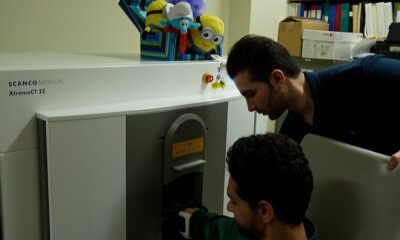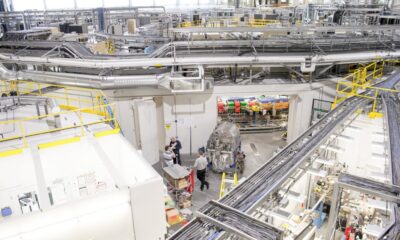Science
University of Saskatchewan Researchers Harness Quantum Computing for Vaccine Development

Researchers at the University of Saskatchewan are pioneering efforts to leverage quantum computing in the fight against future pandemics. Their goal is to expedite vaccine development by utilizing advanced computational methods that go beyond the capabilities of current technology. This initiative aims to enable the rapid identification and creation of vaccines for emerging infectious agents in under 100 days.
The project is a collaboration between the Centre for Quantum Topology and Its Applications (quanTA) and the Vaccine and Infectious Disease Organization (VIDO). According to Steven Rayan, director of quanTA, quantum computers have the potential to unlock crucial insights about the human immune system. “You can use these quantum computers to access very special information about the immune system,” he explained, emphasizing the societal benefits of their research.
Quantum computing offers a unique advantage by enabling scientists to create a “digital twin” of pathogens. Gordon Broderick, VIDO’s principal investigator, stated that this digital representation allows researchers to run various scenarios rapidly. By simulating different vaccine designs and protective agents, they can focus on the most promising candidates before conducting lab experiments. This approach significantly speeds up the research process compared to traditional methods.
Rayan noted the limitations of conventional computers, which operate on binary systems of zeros and ones. In contrast, quantum computers mimic natural processes at a fundamental level, making them better suited for complex biological simulations. Despite the technology still being in its infancy, the researchers are eager to implement quantum computing applications rather than wait for its final development.
To facilitate this research, the university has partnered with IBM to gain remote access to quantum computing systems located in Quebec. This collaboration also provides students with the opportunity to work with cutting-edge technology, a rarity in educational institutions worldwide.
The current wave of quantum computing is likened to the early days of classical computing, where significant advancements were achieved through experimentation and innovation. Rayan expressed a desire not to delay progress, stating, “A lot of quantum computing is really just being treated in a theoretical way at the moment. We’re not really willing to wait.”
As the world continues to grapple with the lessons learned from the COVID-19 pandemic, this initiative at the University of Saskatchewan underscores the importance of preparing for future health crises with innovative solutions. This research could pave the way for faster responses to emerging pathogens and ultimately save lives.
-

 World4 months ago
World4 months agoScientists Unearth Ancient Antarctic Ice to Unlock Climate Secrets
-

 Entertainment4 months ago
Entertainment4 months agoTrump and McCormick to Announce $70 Billion Energy Investments
-

 Lifestyle4 months ago
Lifestyle4 months agoTransLink Launches Food Truck Program to Boost Revenue in Vancouver
-

 Science4 months ago
Science4 months agoFour Astronauts Return to Earth After International Space Station Mission
-

 Technology2 months ago
Technology2 months agoApple Notes Enhances Functionality with Markdown Support in macOS 26
-

 Top Stories3 weeks ago
Top Stories3 weeks agoUrgent Update: Fatal Crash on Highway 99 Claims Life of Pitt Meadows Man
-

 Sports4 months ago
Sports4 months agoSearch Underway for Missing Hunter Amid Hokkaido Bear Emergency
-

 Politics3 months ago
Politics3 months agoUkrainian Tennis Star Elina Svitolina Faces Death Threats Online
-

 Politics4 months ago
Politics4 months agoCarney Engages First Nations Leaders at Development Law Summit
-

 Technology4 months ago
Technology4 months agoFrosthaven Launches Early Access on July 31, 2025
-

 Top Stories1 week ago
Top Stories1 week agoFamily Remembers Beverley Rowbotham 25 Years After Murder
-

 Entertainment4 months ago
Entertainment4 months agoCalgary Theatre Troupe Revives Magic at Winnipeg Fringe Festival





















